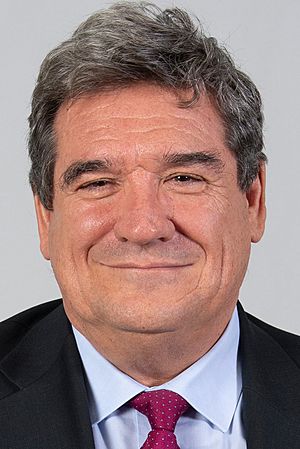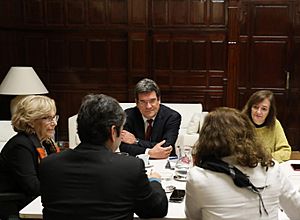José Luis Escrivá facts for kids
Quick facts for kids
The Most Excellent
José Luis Escrivá
|
|
|---|---|

Official portrait, 2023
|
|
| 71st Governor of the Bank of Spain | |
| Assumed office 6 September 2024 |
|
| Preceded by | Pablo Hernández de Cos |
| Minister for Digital Transformation and Civil Service | |
| In office 21 November 2023 – 6 September 2024 |
|
| Prime Minister | Pedro Sánchez |
| Preceded by | Nadia Calviño (Digital Transformation) María Jesús Montero (Civil Service) |
| Succeeded by | Óscar López Águeda |
| Minister of Inclusion, Social Security and Migration | |
| In office 13 January 2020 – 21 November 2023 |
|
| Prime Minister | Pedro Sánchez |
| Preceded by | Magdalena Valerio (Labour, Migration and Social Security) |
| Succeeded by | Elma Saiz |
| Chairman of the Independent Authority for Fiscal Responsibility | |
| In office 22 February 2014 – 13 January 2020 |
|
| Monarch | Felipe VI |
| Prime Minister | Mariano Rajoy (2014–2018) Pedro Sánchez (2018–2020) |
| Preceded by | Office established |
| Succeeded by | Cristina Herrero |
| Chairman of the EU Independent Fiscal Institutions Network | |
| In office 24 September 2015 – 7 November 2019 |
|
| Preceded by | Office established |
| Succeeded by | Seamus Coffey |
| Personal details | |
| Born |
José Luis Escrivá Belmonte
12 May 1960 Albacete, Spain |
| Political party | Independent |
| Spouse | María del Carmen García de la Osa |
| Children | 2 |
| Alma mater | Complutense University of Madrid |
| Occupation | Economist • Politician |
| Awards | Bachelor's Degree Extraordinary Award |
José Luis Escrivá Belmonte (born December 5, 1960) is an important Spanish economist and politician. He currently serves as the governor of the Bank of Spain. This is a very important job in Spain's financial world.
Before becoming the Bank of Spain's governor, he held several key positions in the Spanish government. He was the Minister for Digital Transformation and Civil Service. He also served as the Minister of Inclusion, Social Security and Migration. Both of these roles were under Prime Minister Pedro Sánchez.
Mr. Escrivá also worked in important financial organizations in Spain and Europe. He was the head of the Independent Authority for Fiscal Responsibility (AIReF) in Spain. He also led the EU Independent Fiscal Institutions Network in Europe. These groups help make sure governments manage their money wisely. He also worked at the European Central Bank and the Bank for International Settlements. In the private sector, he worked for the BBVA banking group.
Contents
Early Life and Education
José Luis Escrivá was born in Albacete, Spain, on December 5, 1960. When he was 18, he moved to Madrid to go to university. He studied Economic Sciences at the Complutense University of Madrid. He even won a special award for his excellent grades. He is married and has two children.
His Career as an Economist
Mr. Escrivá started his career at the Bank of Spain. He worked in different roles there, focusing on economic studies. He also played a part in the European Union's financial plans. Since 1993, he advised on the creation of the European monetary union.
When the European Monetary Union was formed, he became the Head of the Monetary Policy Division at the European Central Bank in Frankfurt. Later, from 2012 to 2014, he was the Chief Representative for the Americas at the Bank for International Settlements.
Between 2004 and 2012, Mr. Escrivá worked for the BBVA Group. He started as their chief economist, leading their research. Later, he became a Managing Director, focusing on public finance.
Leading Financial Watchdog Groups

In 2014, the Spanish government chose José Luis Escrivá to be the first chairman of the Independent Authority for Fiscal Responsibility (AIReF). This group was created to check how the government manages its money. He stayed in this role until January 2020.
In 2015, he was also chosen to lead the EU Independent Fiscal Institutions Network. This new group helps different European countries share ideas about managing their finances. He was re-elected in 2017 and finished his second term in 2019.
Minister of Social Security
On January 10, 2020, José Luis Escrivá was appointed as the first head of the Ministry of Inclusion, Social Security and Migration. This new government department handles important areas like social security, helping people integrate into society, and managing migration.
He officially took his oath to King Felipe VI on January 13. At the same time, he left his role as chairman of AIReF.
In February 2020, he explained his department's main goals to the Spanish Parliament. He focused on three key areas:
- Pensions: Making sure the pension system is strong and fair for everyone.
- Inclusion: Creating new policies to help reduce inequality and social exclusion.
- Migration: Developing new rules to help and support migrants.
He emphasized that he wanted to achieve these goals with broad agreement from different groups.
One important idea he proposed was a minimum vital income. He said this would be a major policy to help people in need.
Minimum Vital Income
When the COVID-19 pandemic hit Spain hard, the work on the minimum vital income sped up. This measure was also supported by other political parties. In April 2020, Minister Escrivá announced that this permanent minimum income would be approved in May. It was expected to help about 3 million people.
After one year, this program had reached 210,000 households, helping 565,000 people. The average benefit was about 458.51 euros per month. The Council of Ministers officially approved the minimum income on May 29.
Governor of the Bank of Spain
In September 2024, José Luis Escrivá was appointed as the governor of the Bank of Spain. This is a very important role in managing Spain's economy and financial system.
See also
 In Spanish: José Luis Escrivá para niños
In Spanish: José Luis Escrivá para niños
 | Kyle Baker |
 | Joseph Yoakum |
 | Laura Wheeler Waring |
 | Henry Ossawa Tanner |

